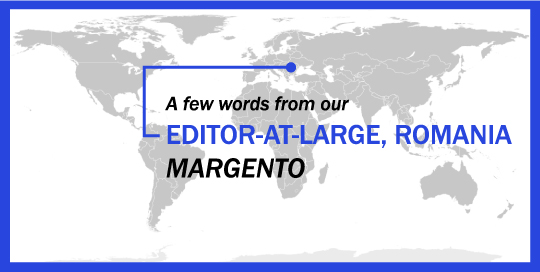MARGENTO (editor-at-large, Romania): “Eutychia,” from our July 2012 issue, has been identified by Simona Popescu—poet, critic, and the foremost authority on Romanian poet Gellu Naum’s (1915 – 2001) work and life—as the Naumian poem par excellence, not in the sense that the rest of his huge oeuvre is contained in it, but because it stands out as one of the most comprehensive and emblematic expressions of the poet’s creed and poetics. And, more importantly, it highlights the unmistakable way in which his work was not only an art but a mode of existence.
A visionary, a great shaman—le grand chaman de Roumanie, as a French critic once called him—whose poems have always worked as Pythic oracles, Naum was also an incredibly shrewd and inclusive craftsman. The very personable and humorously playful person that he was in everyday life was the same as the artist who integrated biographical details, political critique, and popular culture (along with erudite and alchemically-oneiric intertexts) into his mesmerizing rhythms, expansive diction, and enthralling imagery. Although—or rather particularly because—he was a true poeta vates, a poet-prophet, he did not look down on the trivialities of common existence. His corrosive ironies never settled upon postmodern detachment, and, instead of rendering the verse flat, his absorption of the ‘insignificant’ actually turned the everyday into something magical, miraculous, and overwhelming.
The psychedelic experience of watching an insect and its colors at the closest range possible, for instance, triggers a sort of meta-rational ‘derangement of the senses’ that helps one to see and hear a poetry of the species and, at the same time, an ecopoetry avant la lettre:
so the psychedelic colored insect
waits for me
with its shape reminiscent of triangular bombardments
the insect-poet looking at me with its deep blue-green eye
struck dumb on an unripe raspberry
the sole survivor of a long extinct species
the newly arrived insect-poet set to witness crazy
death by tragic multiplication
as I am certain it recognizes me
as far back
as when the times got tangled
I sit on a rock and look forward
through tangled times
as a psychedelic age arrives while the rest is merely
a golden blue-green ethereal triangular insect
trying to communicate words
In fact, the poem’s very title, which could be translated as “true luck” or “good fortune” (from Ancient Greek) speaks of a search for—or conjuring of—good omens, of what brings good luck and a good fate, and the poem thus assumes the role of an amulet or a spell. Yet this is not solely about one’s personal fate, as the root of the word, Týche (Latin equivalent: Fortuna), was in ancient times the presiding tutelary deity that governed the fortune and prosperity of a city, its destiny. This city, one starts to suspect while plunging into Naum’s ocean of images, is one of the whole world (humans, nature, and cosmos together), and contemplating its destiny means envisioning—to paraphrase Eliot—its end in its beginning; and both its beginning and end are fractally present in our insect-tiny daily life: “Only when beginning at the end are we able to understand/ the nostalgic mechanics of daily events the fury of layers preceding and/ following us…”
The surprising relevance of such a poet nowadays (famous in Romania and widely known in France and Germany, but until recently virtually unknown to the English-speaking world) is very likely one of the reasons why his recent selected poems in (facing page) translation, Athanor & Other Pohems from Calypso Editions, were named one of 2013’s most notable translations by World Literature Today .
One Romanian poet I would love to see featured in Asymptote in the near future is Șerban Foarță. Foarță is one of the greatest writers in postwar Romania who, because of his subtle, euphonic, and pervasive formalism has hardly been, if ever, translated into English (or any other language, for that matter). A versatile and tirelessly prolific practitioner of forms ranging from ‘classic’ and troubadour traditions to rock lyrics and experimental chiasmic “holograms,” he has authored an oeuvre of such pitch, variety, and amplitude that one could indeed—as younger poet Emilian Galaicu-Păun allegedly (jocosely but relevantly) did before meeting the writer in the flesh—suspect that behind his name hides an entire institute of philology and poetics.
So that we can continue beyond our January 2015 issue and introduce Șerban Foarță in our pages one day, please consider joining 203 donors in support of our Indiegogo campaign now! Thank you so much!

